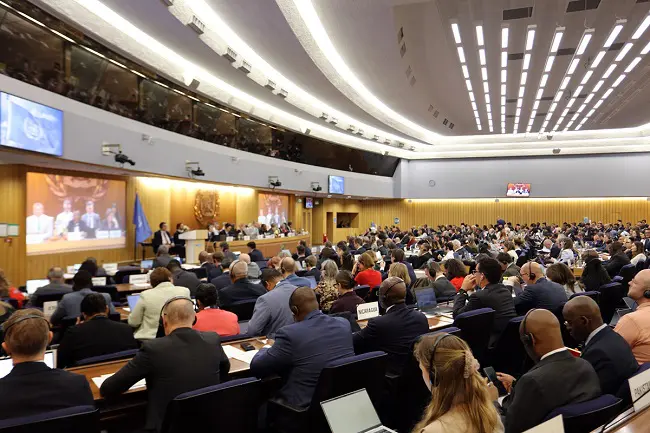Olusegun Ariyo
Diplomats at the UN’s International Maritime Organization (IMO) have agreed to the world’s first-ever carbon pricing mechanism applied to a major polluting industry – global shipping.
Starting in 2028, ships will be required either to transition to lower-carbon fuel mixes or pay for the excess emissions they generate. Vessels that continue to burn conventional fossil fuels will face a $380 per tonne fee on the most intensive portion of their emissions, and $100 per tonne on remaining emissions above a certain threshold.
The policy, which was backed by 63 countries including Brazil, China, the EU, South Africa, Kenya, Senegal and Namibia, sets a global precedent: Despite objections from petro-states like Saudi Arabia, the UAE, Russia, and Venezuela – who opposed both the substance and the procedure of the agreement – Norway’s compromise proposal, as the Chair of the IMO, passed in the final vote.
At UN climate talks in Baku in November 2024, countries agreed to a post-2025 $1.3 trillion climate finance deal to support developing countries in the energy transition. Countries are looking to public, private and innovative sources of finance to close the climate finance gap.
Vote breakdown:
*63 in favor: including the EU, China, India, Japan, Korea, South Africa, Singapore, Norway, Kenya, Namibia and Senegal
*16 against: including Saudi Arabia, UAE, Oman, Algeria and Morocco
*25 abstentions: including Pacific Island states (such as Tuvalu, Kiribati, and Fiji), Seychelles, Egypt, Ghana, Liberia, Madagascar, and Uganda
The US delegation was not present at the time of the vote and stuck to its principle of not engaging in negotiations after circulating a text delegations to walk Encourage out from negotiations as revealed earlier on Wednesday, April 9.
Tuvalu, speaking on behalf of Pacific nations, voiced disappointment in the plenary, raising concerns about the lack of transparency in the process and, exclusion of vulnerable nations from negotiations, and raised the point that the new plan will fail to incentivize the use of cleaner fuels.
un-agrees-global-carbon-tax-on-maritime-shipping-deal-fails-to-ad- A group of 60+ countries led by the Pacific had pushed for the revenue to go towards broader climate finance use beyond the shipping industry.
The carbon pricing mechanism, based on emissions intensity, will initially allow the use of fossil liquefied natural gas (LNG). However, the regulation will progressively penalise the use of gas by the shipping industry.
Minister Antony Derjacques of the Seychelles said, “The developing countries with the greatest need came here and offered a solution. How can the other major economies ask us to take a weak deal home to our people, who are suffering as a result of the climate crisis? And how can they take it back to their constituents?”
Maria Ogbugo, Senior Associate at African Future Policies Hub, said: “In the end, the best possible outcome was achieved. The shipping industry has taken the lead in showing other hard-to-abate sectors that climate action is possible. African delegations must be commended, including Kenya, Namibia, Senegal, South Africa, and others who rose to the occasion and supported the compromise.
“Now that the IMO has agreed on measures that would apply on a global level, it is key that the various regional emissions schemes start seriously considering pulling back on their unilateral measures to avoid multiplicity of schemes piling up layer after layer of costs on African consumers.”
Faten Aggad, Executive Director of African Futures Policies Hub, said: “Reaching consensus on decarbonization measures was bound to be difficult. But we saw a consensus outcome supported by many nations, including African states like Kenya, Senegal, Namibia, and South Africa. What we have now is a measure that still puts a price on the shipping sector’s emissions, an important starting point on which more ambition could be further built, without creating shocks on economically vulnerable countries.”
Eldine Glees, Maritime Policy Advisor at the Micronesian Centre for Sustainable Transport, said: “A universal carbon levy represents a rare opportunity to transform climate risks into sustainable development investment. Several African delegations demonstrated exceptional leadership in the technical negotiations by connecting the levy directly to critical priorities of food security, climate resilience, and equitable revenue distribution. Maintaining this united approach will be essential as implementation discussions begin.”
Ralph Regenvanu, Minister of Climate Change Adaptation, Meteorology, Geo-Hazards, Environment, Energy, and Disaster Management of Vanuatu, said: “Let us be clear about who has abandoned 1.5°C. Saudi Arabia, the US and fossil fuel allies pushed down the numbers to an untenable level and blocked progress at every turn. These countries – and others – failed to support a set of measures that would have gotten the shipping industry onto a 1.5°C pathway. And they turned away a proposal for a reliable source of revenue for those of us in dire need of finance to help with climate impacts.”
Ambassador Albon Ishoda, Marshall Islands Special Envoy for Maritime Decarbonization, said: “We are not done. We will be back. Alongside our friends from the Caribbean, the Pacific, Africa, Central America, and the UK. Still standing. Still steering.”






